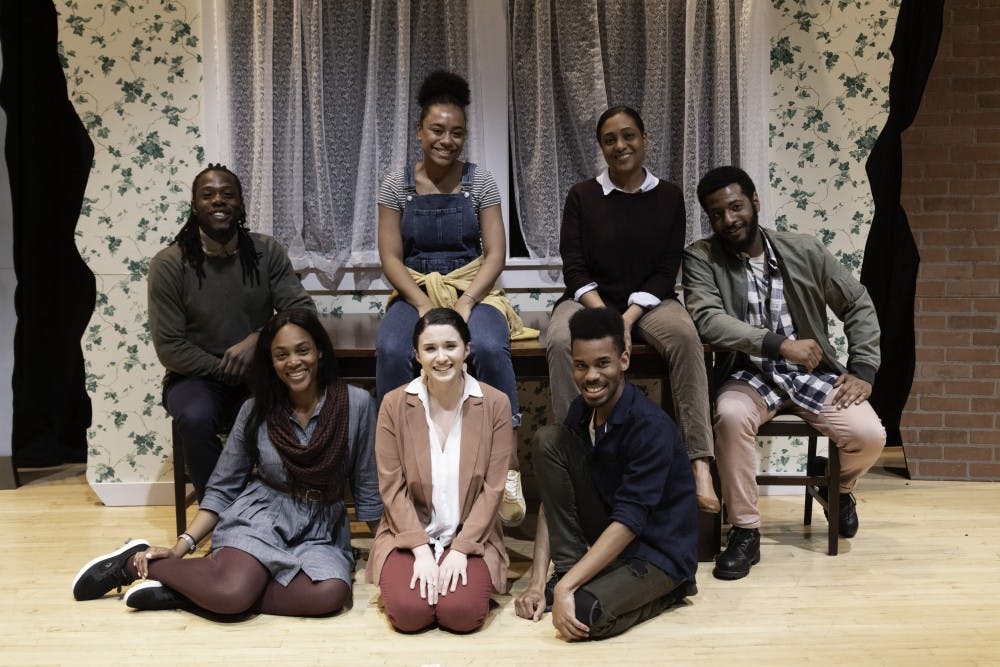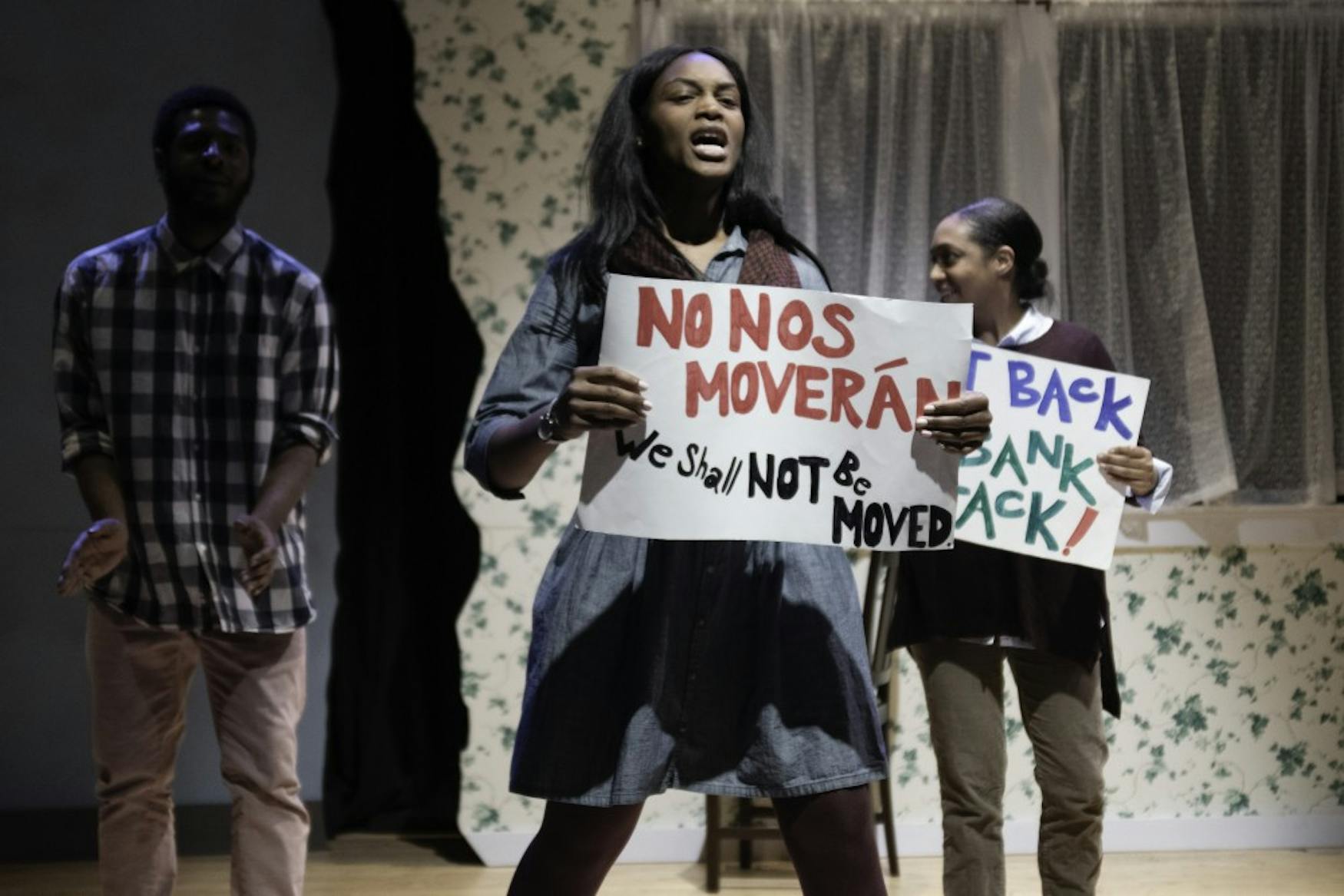From reality to stage: an interview with This Place/Displaced
From May 2 to 4, Brandeis hosted four showing of “This Place/Displaced,” a theater production that focus on the issue of gentrification and displacement in the Greater Boston area. The event was able to happen thanks to the effort of the Brandeis Univeristy minor in Creativity, the Arts, and Social Transformation. Last week, justArts & Culture spoke to Anneke Reich, the producer of “This Place/Displaced” and a Brandeis alumna, and Joshua Glenn-Kayden, the director of the show.

THE REAL LIFE STORY: All seven stories in This Place/Displace are based on real stories of residents of the Greater Boston area.
JA&C: Tell me a bit about yourself and what you do in the project.
Anneke Reich: I graduated from Brandeis in 2013. And I am the artistic director of the Artist’s Theater of Boston. So I had a producing role on the show and I was also part of the team that conceived the concept of the production in this structure.
Joshua Glenn-Kayden: I am the director of the production. So last year, Anneke and ATB asked me to come on board to direct, and we in our rehearsal process took the seven plays you will see tonight.
JA&C: When people talk about displacement, people think about war zones, natural disasters that caused people to lost their home. Rarely do people connect it with places like Boston or New York City. What was the first reaction when you started getting involved with the project?
AR: So the topic of gentrification and displacement is a very big deal in the Boston area. And a lot of people know that, either because they’ve personally are experiencing it or because they heard other people talking about it, so it is a topic of conversation. … So one of our goals of this production process was to work with folks doing organizing and community work, fighting displacement of people who have been living in Boston on for a long time and/or are immigrating to Boston and deserve to be able to live here, and bring awareness to folks who may not understand the impact they’re having either consciously or not. … And part of what we have done in this production process is bring in community organizers to the post-show ‘talk box’ to talk to the audiences about what they actually can do on practical level to be part of the fight against gentrification.
JA&C: Can you tell us a bit about the term gentrification?
AR: So when we talk about gentrification and displacement in Boston we are really talking about what happens to an area when people with more resources, financial resources, can afford to move in and that what that ends up doing is a displacing people who have been living there for a long time who can no longer afford what people talk about as the market price of housing.
JA&C: I read about a previous report on “This Place/Displaced” and one thing I found really interesting is that there were eight different writers who contributed to the project. What is it like to have so many different voices contributing to the project?
AR: It’s actually seven playwrights. We reached out to the people in the Greater Boston community, who are residents, who have had personal experience with eviction or displacement, largely if not entirely because of gentrification. These are people who want to have their stories staged and performed in a theatrical way. So we pair these people who wanted their story to be in a play with playwrights. So seven people, who we call our community partners, work in partnership with seven playwrights to each ... co-construct a narrative. And these seven plays make up the collection that is This Place/Displaced.
JGK: It is a huge leap of faith for someone to say to a theater company: “Yes, here is what I went through,” and put it on stage. And I think we all feel a real responsibility to be honest and accurate and true to all of their story and their tensions, because I think so much of the point of this is to say these people’s stores are really vital and they should be heard.
AR: Yeah, I couldn’t agree with that more. I think part of the way we dealt with that weight and responsibility was we as company members played a role in checking in with the community partners throughout the original process. Asking how they are feeling about the way their story was being written to make sure they felt involved enough in a process of how their stories were being written, if they wanted that to still be involved in the process.
JGK: We had a few of those community partners come to rehearsals and we had a few of them come to the shows and be a part of the post show discussion panel. And we have been really lucky to have them so involved in the process. I think their presences within the work makes it ... better.
JA&C: A review on the show mentioned that the production was done in a way that is true to itself but not being, quote from the article, too “preachy,” “dry” or “heavy.” What was the process like to balance the artistic side of a play on stage and still been to true to the original stories?
AR: So one thing is that the playwrights that we collaborated with are all very beautiful, talented writers and thinkers. And I think what it meant to trust these playwrights with the stories was to trust them with this balancing act. First of all, honoring whatever aspect of each community partners’ story that they felt needed to be included. … I know some people might have interpreted some of that as coming off preachy, but if that’s what the community partner wanted, it’s going to be there, and that’s how we took that stance fundamentally… It is their story, and if the message is particularly skewed, one might say, we thought that was just inherently important. But also these playwrights are, you know, really talented writers and storytellers, and what they were able to do is, in their own way, elevate the emotional side of these stories and really make them feel like a piece of storytelling, rather than you’re sitting in front of a person lecturing you about the issues of housing inequity.
JGK: The personal is the political. So having these stories on stage and being true to these specific stories is inherently political, because it’s an act of representation and putting these stories at the forefront. And I am not too worried about things being preachy because I think if we are accurate, loving and respectful in the way we work with the stories, the message emerges no matter what, and I think the message is the point.
AR: Not to mention we as an organization and our collaborators all just deeply share the belief that we want to fight housing inequity and fight for equity injustice, and we chose to partner with people and work with organizations who not only agree with us but also fight every day for that, so we are making a stance.
JA&C: Being an alumna coming from Brandies now working in the theater industry, what would you like to tell students who are majoring in theater or are interested in working in the area in the future?
AR: Take care of yourself and making sure that you have the capacity to take on different things. Get to know the larger community in Boston. Start taking steps to see more theater that’s happening in the Greater Boston community. Reach out to folks if you are really compelled by things you see. And begin to develop your own artistic values and identity from doing a lot of listening and a lot of learning because you’re listening.



Please note All comments are eligible for publication in The Justice.